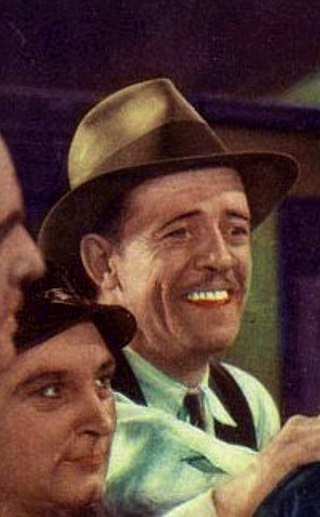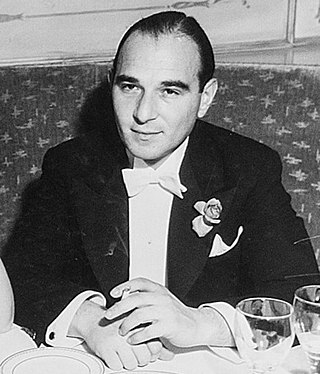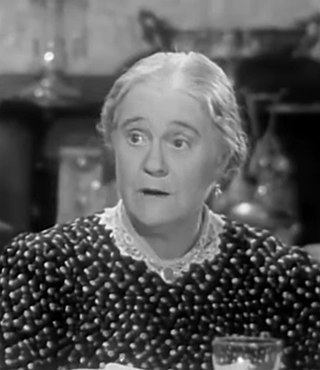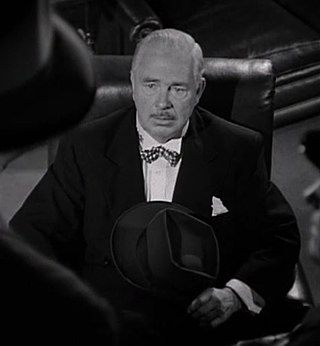Related Research Articles
Robert Florey was a French-American director, screenwriter, film journalist and actor.

William Clement Frawley was an American vaudevillian and actor best known for playing landlord Fred Mertz in the sitcom I Love Lucy. Frawley also played "Bub" O'Casey during the first five seasons of the sitcom My Three Sons and the political advisor to the Hon. Henry X. Harper in the film Miracle on 34th Street.

Tom London was an American actor who played frequently in B-Westerns. According to The Guinness Book of Movie Records, London is credited with appearing in the most films in the history of Hollywood, according to the 2001 book Film Facts, which says that the performer who played in the most films was "Tom London, who made his first of over 2,000 appearances in The Great Train Robbery, 1903. He used his birth name in films until 1924.

Marion Byron was an American silent film actress and comedian.

Robert William Armstrong was an American film and television actor noted for playing Carl Denham in the 1933 version of King Kong by RKO Pictures. He delivered the film's famous final line: "It wasn't the airplanes. It was beauty killed the beast."
The Santa Margarita Stakes is an American Thoroughbred horse race run annually in early April at Santa Anita Park in Arcadia, California for fillies and mares age four and older, it is contested on dirt over a distance of one and one-eighths miles.

Robert Riskin was an American screenwriter. He is best known for his collaborations with Frank Capra.

Arthur Charles Miller, A.S.C. was an American cinematographer. He was nominated for the Oscar for Best Cinematography six times, winning three times: for How Green Was My Valley in 1941, The Song of Bernadette in 1944, and Anna and the King of Siam in 1947.

Hugh Herbert was an American motion picture comedian. He began his career in vaudeville and wrote more than 150 plays and sketches.

George Meeker was an American character film and Broadway actor.

Hobart Cavanaugh was an American character actor in films and on stage.

Edward Russell Hicks was an American film character actor. Hicks was born in 1895 in Baltimore, Maryland. During World War I, he served in the U.S. Army in France. He later became a lieutenant colonel in the California State Guard.

Mary Gordon was a Scottish actress who mainly played housekeepers and mothers, most notably the landlady Mrs. Hudson in the Sherlock Holmes series of movies of the 1940s starring Basil Rathbone and Nigel Bruce. Her body of work included nearly 300 films between 1925 and 1950.

Ethel Griffies was a British actress. She is remembered for portraying the ornithologist Mrs. Bundy in Alfred Hitchcock's classic The Birds (1963). She appeared in stage roles in the United Kingdom and the United States, and had featured roles in around 100 motion pictures. Griffies was one of the oldest working actors in the English-speaking theatre at the time of her death at 97 years old. She acted alongside such stars as May Whitty, Ellen Terry, and Anna Neagle.

Jack La Rue was an American film and stage actor.

Dorothy Yost, later married as Dorothy Yost Cummings, was a prominent screenwriter whose career lasted from the silent era well into the sound era. Over her lifetime, she worked on more than 90 films, including her own screenplays. She was born in St. Louis, Missouri, and died in Monrovia, California.
Ernst Fegté was a German art director. He was active in the American cinema from the 1920s to the 1970s, he was the art director or production designer on more than 75 feature films. He worked at Paramount Studios at the height of his career and won an Academy Award for Best Art Direction for Frenchman's Creek (1944). He was also nominated in the same category for three other films: Five Graves to Cairo (1943), The Princess and the Pirate (1944), and Destination Moon (1950). He also worked in television in the 1950s and was nominated for an Emmy Award in 1956 for his work on the series, Medic.

Frederick Hugh Herbert was a playwright, screenwriter, novelist, short story writer, and infrequent film director.

Charles Cahill Wilson was an American screen and stage actor. He appeared in numerous films during the Golden Age of Hollywood from the late 1920s to the late 1940s.

William Kerry Halligan was an American stage and film actor, and writer.
References
- 1 2 "80,200 See War Knight Win Santa Anita Handicap". Chicago Sunday Tribune . Associated Press. March 10, 1946.
Charging into the lead in the last few strides, War Knight, 6 year old bay horse owned by Miss Ethel Hill, Hollywood scenario writer, won the $100,000 added Santa Anita Handicap in a photo finish.
- 1 2 "Movie Magnates Eye Easy Dough". Salt Lake Tribune . Associated Press. December 23, 1945 – via Newspapers.com.
Screenwriter Ethel Hill plans to mop up with War Knight, winner of the Arlington Handicap in 1944

- 1 2 Jimmie Fidler (April 7, 1946). "Jimmie Fidler in Hollywood". Monroe Morning World – via Newspapers.com.
Ha! Screen-Writer Ethel Hill, whose nag won the $100,000 Santa Anita Handicap, had to change her phone number to escape from too-insistent salesmen!

- 1 2 Norman, Marc (October 8, 2008). What Happens Next: A History of American Screenwriting. Crown Publishing Group. p. 136. ISBN 978-0307450203 . Retrieved January 6, 2015.
- ↑ "9 Jul 1978, 366 - The Los Angeles Times at Newspapers.com". Newspapers.com. Retrieved 2019-02-22.
- 1 2 3 4 Morton Cathro (March 2, 2005). "Hollywood Ending". bloodhorse.com. Retrieved January 7, 2015.